The Mastercard Foundation envisions a world where everyone has the opportunity to learn and prosper. We believe that all people, no matter their starting point in life, should have an equal opportunity to succeed.
Since its founding in 2006, the Mastercard Foundation has grown from a small “start-up” with just three employees to one of the largest foundations in the world. In our first decade, we’ve partnered with more than 130 visionary organizations to increase financial inclusion and access to youth learning in Africa. Together, we have improved the lives of more than 25 million people and their families.
Based on what we’ve learned through our work, we have developed a new strategy, Young Africa Works. It builds on what we’ve achieved over the last decade and is the result of extensive consultation with leaders of African governments, private sector organizations, educational institutions, civil society, and, most importantly, young people themselves. Using youth employment as an indicator of progress, we believe this strategy will help millions of Africans find a pathway out of poverty for themselves and their families.
We value ongoing learning and the insight we’ve gained through our work in Africa. It informs our new strategy.
Employment, particularly formal employment, leads to poverty reduction. We have tracked a range of indicators measuring how the lives of the poor are improving through our work in Africa. Employment has emerged as a key predictor of people’s path and progression out of poverty. In particular, when young people can secure formal work and a steady wage, their lives improve. Similarly, the World Bank also finds that employment and self-employment are how most people, particularly in Africa, find a way out of poverty.
Young people in Africa struggle to find formal work. In Africa, most people must make a living through a variety of subsistence activities. According to the International Labour Organization, almost 80 percent of people in Africa work informally. Recent research undertaken by our Foundation in two countries in Africa found that among young people, very few had access to formal employment and most struggled to make a decent salary to live. All lived well below $10 per day. Those who could access steady employment were much better off than those who couldn’t.
Financial inclusion creates jobs. Employment opportunities have increased through our work in financial inclusion. When small firms and entrepreneurs access financial services, they have the resources to grow, expand, and create job opportunities for others in the community. The benefits go beyond the entrepreneur and small business owner accessing the finance. There is a ripple effect that creates employment for others, providing them with a pathway out of poverty.
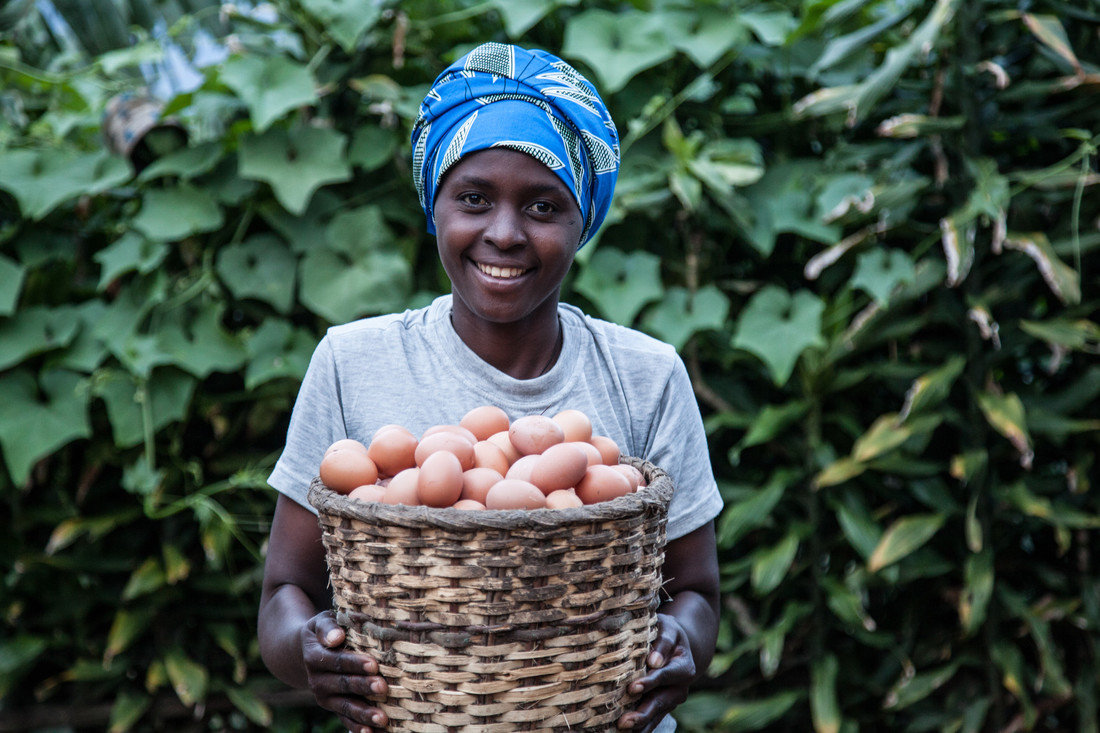
Africa is the youngest and fastest-growing continent in the world. We believe in the potential of Africa’s young people. They are optimistic and energetic. The time is right for the Foundation to drive systemic change in financial inclusion and education with the aim of increasing youth employment to reduce poverty.
Over the next 12 years, the number of young people in the African labour market will increase to 375 million. According to the International Monetary Fund, population growth on the continent means that by 2035, there will be more young people entering Africa’s workforce each year than in the rest of the globe combined.
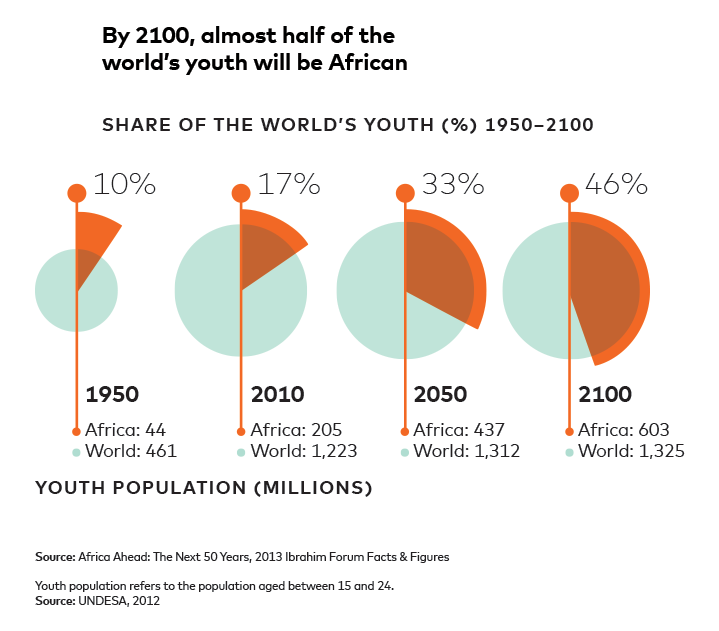
This generation is healthier and better educated than their parents. Through technology, they have easier access to information, consumer goods and services. The world they live in is more democratic. While the circumstances of their lives are measurably better than they were for past generations, a significant gap between the number of young people seeking work and the limited employment opportunities available to them means that they will face challenges finding formal employment, and a pathway out of poverty. Moreover, for some time, we’ve observed a mismatch between the skills of young people entering the workforce and the needs of employers.
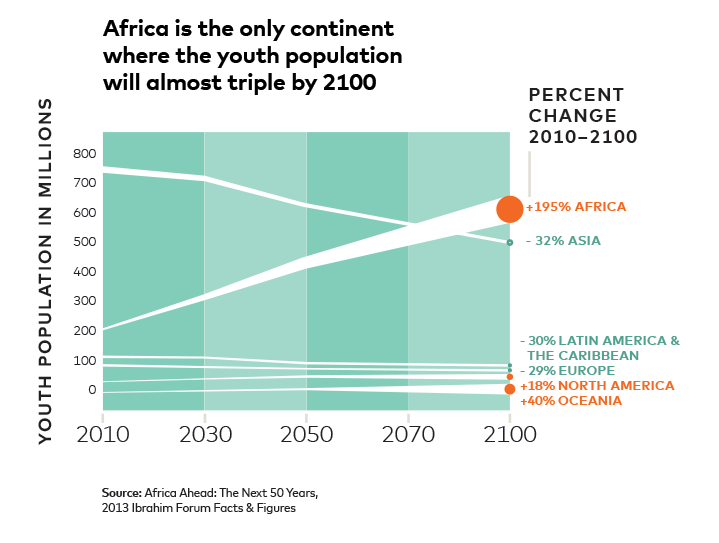
Between 2018 and 2030, the Foundation will devote our expertise, networks, and resources to finding solutions to this challenge. Through innovation and entrepreneurship, young people are building a better future for Africa, but they cannot do it alone.
To align with the definition used by most African countries, we refer to “youth” as those between the ages of 12 and 35 years. Young people are not a homogenous group. Their needs vary by age, gender, geography, level of formal education, level of family income, and stage of life. Some segments of youth, such as girls and young women, rural youth, refugees, and those who are financially disadvantaged, face unique challenges.
The Foundation will ensure that our programming is appropriately tailored to the specific realities of these different groups.
The Foundation’s goals for the next decade are built on our optimism for Africa’s future. We recognize that employment is a leading pathway out of poverty for families. In Africa, the world’s youngest continent, youth employment is a particularly important measure of poverty reduction.
Africa is a vibrant, diverse continent. Improving education and training, finding new ways to link people to opportunity, and increasing financial inclusion are all a part of the solution. Our approach should reflect the unique challenges and opportunities of the country in which we are working.
Young women face additional barriers to skills development and accessing work. Breaking down these barriers is essential to our success.
On-the-ground knowledge and expertise is the bedrock of the Foundation’s work. Partnering with African organizations, be they government, private sector, or philanthropical, is a priority.
Technology has the power to connect young people to their first job, including apprenticeships and cooperative programs. It also enables faster, more efficient access to capital, talent, and business support for entrepreneurs. It drives growth, inclusion, and poverty reduction.
In a rapidly changing environment, creative solutions are needed. We will work to find new insights and share them with others to magnify our impact.
The Foundation’s new strategy builds on our experience in financial inclusion and, education and training. We will monitor employment as a key indicator of our progress in reducing poverty for young people, particularly young women.
We are currently working in 29 countries across Africa. Through initiatives such as the Mastercard Foundation Scholars Program, we are fostering a cohort of next-generation leaders who will contribute to social transformation and economic growth on the continent.
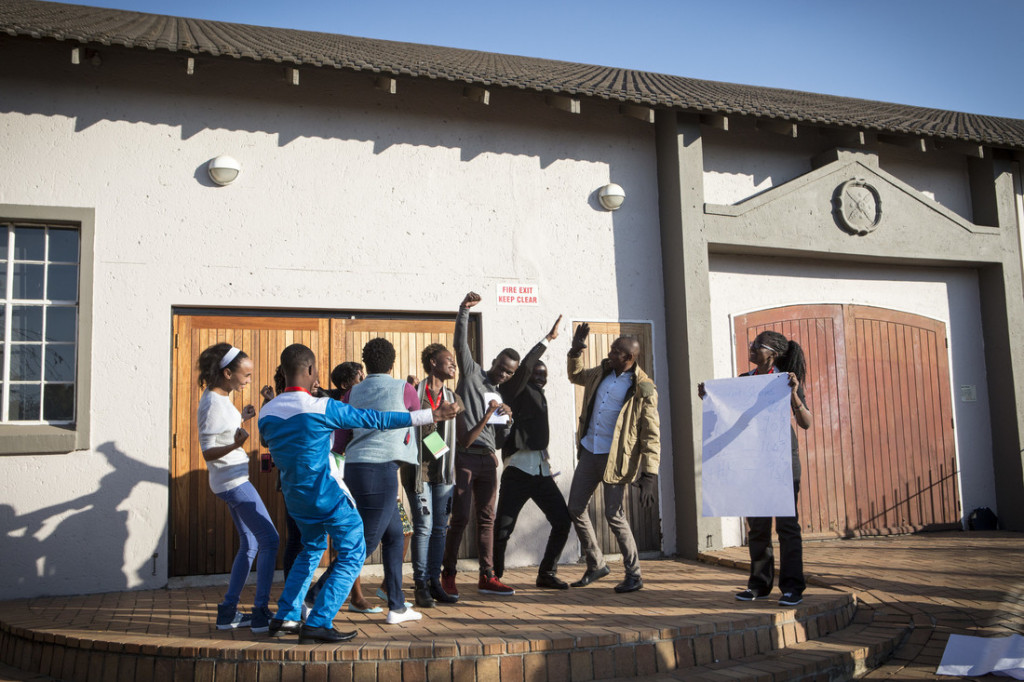
Mastercard Foundation Scholars participating in a workshop at Baobab Summit: South Africa 2017
With our new strategy, we will deepen our engagement in a smaller number of countries and pursue a greater understanding of their economic priorities and opportunities. We will begin by listening. Based on what we learn, we will determine a long-term plan that aligns with their national aspirations and economic strategies. Working with governments and the private sector, our plan will identify priority sectors of the economy that will drive growth and increase employment opportunities.
Education and financial inclusion will be the backbone for change. We will work with others in-country to improve the quality of education and vocational training so that it equips young people with the skills employers need. Our activities will connect employers and job-seekers, and enable entrepreneurs and small businesses to expand through access to financial services.
We expect to work in a diverse group of countries with high levels of young people living in poverty who are vulnerably employed. These countries will have an enabling environment for growth, job creation, education and skills development, and an ability to influence within regions. We will also prioritize working with African organizations.
As we do this, we will continue to learn, share knowledge, catalyze innovation, and mobilize others across the continent.
Technology is rapidly changing the future of work around the globe. Africa is in the early stages of a technological revolution characterized by the widespread use of mobile technology. It’s changing the nature of work on the continent and creating greater opportunity for workers to be connected to the economy and each other.
The digital technology sector, especially, will continue to be a source of new employment opportunities. Education systems must equip students with advanced ICT skills that will enable young Africans to not only leverage new technology but create the technology of the future. Additionally, technology is driving the modernization of the agricultural sector. Until at least 2050, more than half of youth in Africa will live in rural areas where agriculture plays a central role in economies.
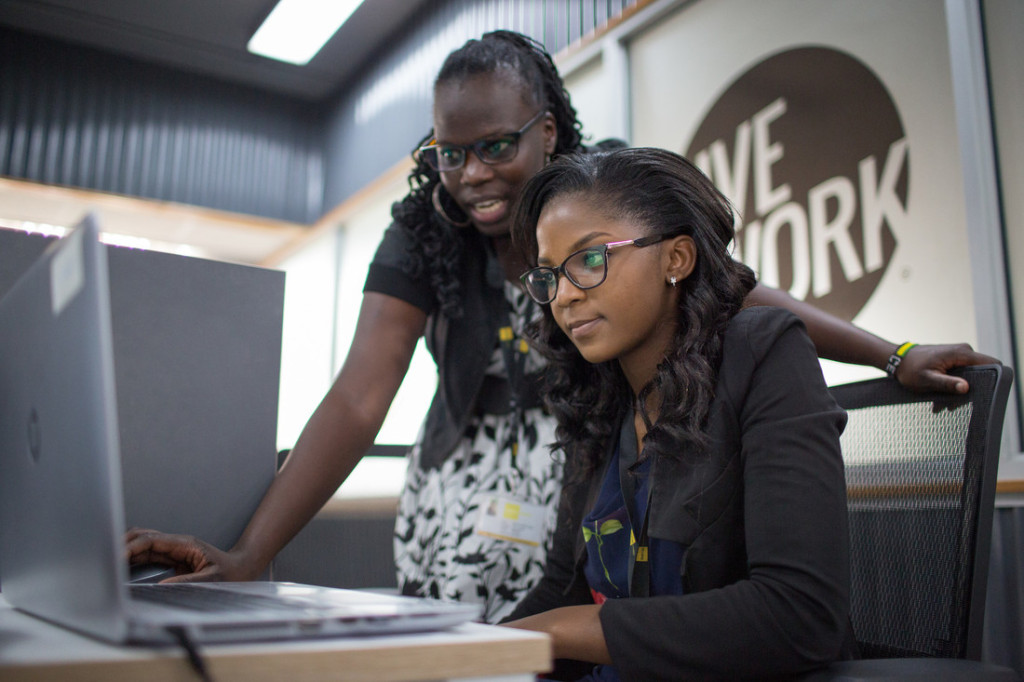
Our partnership with the African Management Initiative leverages technology to reduce the cost of skills training and provide young people with skills directly aligned with employer needs.
There is also the possibility that technology may create greater inequality. Automation and artificial intelligence could pose a risk in some countries.
The Foundation will monitor emerging trends to ensure that our strategies are relevant and that we help countries and young people plan for a changing future.
The insight of young people has shaped this strategy. Their voices and ambitions guide us, and will continue to play a central role as we move forward.
Young people want to drive the change. They want to be more than just beneficiaries of programs; this generation want to be job creators. They believe their input is critical in the development of programs, policies, and decisions that affect youth employment.
“Nothing for the youth without the youth.”
Young Africans have a vision for a more inclusive future. Over and over, they told us to be bold in our goals. Young women, rural youth, and refugees face additional barriers to gaining employment. The Foundation must do more to break down the walls of inequality and empower the most vulnerable.
“We Africans should take up the challenge to confront problems that are approaching us head-on and also harness opportunities knocking at our doors. We should do so with a very strong spirit, fully believing that if we don’t take the lead, no outsider will be able to uncover the opportunities that we know, let alone solve our problems without us.”
They believe in the power of innovation and technology. Young people believe that they not only need to be equipped with the skills required to use current technology, they want to lead in the development of the technology of tomorrow. To that end, there will be an emphasis on bolstering STEM education as we move forward.
“I’m personally tired of discussing problems. I am a mover, I’m a shaker. I want us to see action. And believe that young people basically are the fulcrum for that in the decade to come.”
Addressing the employment challenge in Africa will not be easy. Its scale and complexity mean that no one organization can solve it alone. We will need to program holistically and work with African governments, the private sector, educators, and other funders. A more formal private sector will be needed, as will increased levels of financial inclusion. The modernization of the agricultural sector and critical growth sectors is key. Supporting African institutions to advance change in their countries will be essential, as will advancing global discussions on the future of work in Africa.
The Foundation is a funder, a convenor, and a catalyst for change in Africa. Ultimately, this change will be driven from within the continent by the character, hard work, and ingenuity of the people on the continent.
The young people of Africa will determine their future. They are leading the way. With the right planning and policies, they will transform a vibrant continent into a powerhouse for global prosperity. Let’s accompany them on their journey and support their aspirations for their communities and countries.